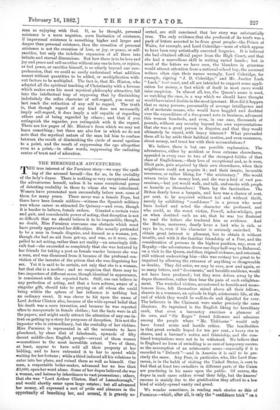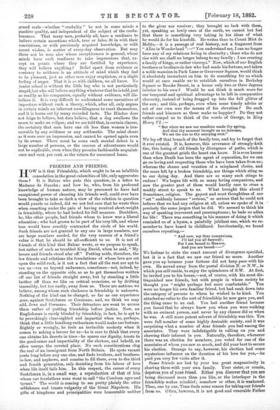THE BIRMINGHAM ADVENTURESS.
THE true interest of the Furnieux story—we copy the spell- ing of the accused herself—lies for us, in the credulity of the lady's dupes. There is nothing so very exceptional about the adventuress herself, unless it be some exceptional power of detecting credulity in those to whom she was introduced. Women have personated men successfully before now, some of them for many years. There never was a female Pope, but there have been female soldiers—witness the Spanish military nun whose career so attracted De Quincey—and even, though it is harder to believe, female sailors. Granted a certain voice and gait, and considerable power of acting, that deception is not so difficult that we should believe it to be impossible, though, no doubt, Miss Furnieux overcame one obstacle which must have greatly aggravated her difficulties. She usually pretended to be a man in female disguise, and dressed as a woman, yet, though she had no aid from get-up, and was, as it were, com- pelled to act acting, rather than act reality—an amazingly diffi- cult feat—she succeeded so completely that she was lectured by her friends for taking a post as female warder because she was a man, and was dismissed from it because of the profound con- viction of the inmates of the prison that she was disguising her sex. Yet it is said to be certain, not only that she is a woman, but that she is a mother ; and no suspicion that there may be two impostors of different sexes, though identical in appearance, is consistent with the reported facts. Still, one can believe in any perfection of acting, and that a born actress, aware of a singular gift, should take to preying on all whom she could bring within the sphere of her influence is nothing but an ordinary event. It was clever to hit upon the name of Lord Arthur Clinton also, because of the wide-spread belief that his death was a mere invention, and because he was reported often to masquerade in female clothes ; but the facts were in all the papers, and might easily attract the attention of any one in- tent on getting up a story for purposes of deception. It is not the impostor who is extraordinary, but the credulity of her victims. Miss Furnieux is represented in all the accounts to have plundered, by sheer dint of falsehoods, upwards of fifty decent middle-class English people—several of them women —sometimes to the most incredible extent. Two of them, at least, appear to have sold all their property at her bidding, and to have entrusted it to her to spend while waiting for her fortune ; while a third induced all his relations to enter into her plans, and ruined them as well as himself. One man, a respectable boiler-maker, advanced her no less than 23,000, upon her word alone. Some of her dupes believed she was a woman, and heiress by inheritance to vast possessions ; others, that she was "Lord Arthur Clinton, Earl of Laneaborough," and would shortly enter upon large estates ; but all advanced her money, all expressed a sort of pride and pleasure in the opportunity of benefiting her, and several, it is gravely as-
serted, are still convinced that her story was substantially true. The only evidence that she produced of its truth was a
pack of letters asserted to be from great people-,—the Prince of
Wales, for example, and Lord Coleridge—none of which appear to have been very artistically executed forgeries. It is believed she had obtained official paper from the High Court, and that she had a marvellous skill in writing varied hands ; but in most of the letters we have seen, the blunders in grammar would attract attention from a national-school boy, the assumed writers often sign their names wrongly, Lord Coleridge, for example, signing "J. D. Coleridge," and Mr. Justice Lush "Lush," tout court, and all are intended to support some appli- cation for money, a fact which of itself in most cases would raise suspicion. In almost all, too, the Queen's name is used, as watching the case, in a way which we should have thought would have raised doubts in the most ignorant. How did it happen that so many persons, presumably of average intelligence and all of moderate means, who would have haggled and doubted over the expenditure of a five-pound note in business, advanced this woman hundreds, and even, in one case, thousands of pounds, without any security beyond her own representations that she was a great person in disguise, and that they would ultimately be repaid, with heavy interest ? What persuaded them all to lay aside their habitual caution, and even meanness, about money, and trust her with their accumulations ?
We believe there is but one possible explanation. The adventuress, either by accident or from extreme shrewdness, appealed in every case to two of the strongest foibles of that class of Englishmen,—their love of exceptional and, as it were, illicit gain, gain acquired by their own shrewdness, when their neighbours could not acquire it ; and their innate, incurable reverence, or rather liking, for "the aristocracy." She would return twice the money lent, and she was a lord of vast pos- sessions,— but yet would walk, and talk, and smoke with people so humble as themselves! There lay the fascination. The Briton dearly loves a bargain, and hero was a chance of cent. per cent, to be acquired without toil and without thrift, merely by exhibiting " confidence " in a person who must have looked and acted the character she professed, and who could, as the worst victim, Powell, acknowledges, put on when doubted. such an air, that he was too flustered to read the letters she tendered him as evidence. And the Briton, moreover, dearly loves a lord who is rich, or says he is, even if his character is seriously smirched. To obtain great interest is pleasant, but to obtain it without trouble, and with it the familiar friendship of a Peer, and the consideration of persons in the highest position, nay, even of Royalty—the adventuress drove one dupe half-way to Balmoral, on a visit to the Queen, and then feigned sickness, and returned, still without undeceiving him—this was ecstasy too great to be impaired by allowing the entrance of anything so disagreeable as doubts. They did enter, we may be sure, now and again, or so many letters, and "documents," and heraldic emblems, would not have been produced ; but they were driven away by the dupes themselves, rather than bear the pain of such enlighten- ment. The wretched victims, accustomed to humble and mono- tonous lives, felt themselves raised above all their fellows, sharers in a romance, an episode in high, aristocratic life, at the end of which they would be well-to-do and dignified for ever.
The believers in the Claimant were under precisely the same illusions. So ingrained is the English liking for hereditary rank, that even a baronetcy exercises a glamour of
its own, and "Sir Roger" found followers and admirers among the people where "Mr. Tichborne " would only have found acute and hostile critics. The bondholders in that great swindle hoped for ten per cent., a heavy rise in shares, and a baronet's notice and friendship, and the com- bined temptations were not to be withstood. We believe that in England no form of swindling is so sure of temporary success as the assumption of an aristocratic name—especially if it 12 recorded in " Debrett "—and in America it is said to be pre- cisely the same. Any Peer, in particular, who, like Lord Dan- raven, is in the habit of visiting the United States, is sure to find that at least two swindlers in different parts of the Union are practising in his name upon the public. Of course, the dupes in such cases seldom reveal their folly, but the knaves' success is mainly due to the gratification they afford to a low kind of widely-spread vanity and greed.
We wonder sometimes, in reading such stories as this of Furnieux—which, after all, is only the " confidenc,e trick" on a grand scale—whether " credulity " be not in some minds a positive quality, and independent of the subject of the credu- lousness. That many men, probably all, have a readiness to believe certain assertions which, true or false, fit in with their convictions, or with previously acquired knowledge, or with secret wishes, is matter of every-day observation. But may there not be men also whose receptiveness is general, whose minds have such readiness to take impressions that, ex- cept on points where they are fortified by experience, they will believe anything ? Belief apart from evidence or contrary to evidence is an attitude of mind which they feel to be pleasant, just as other men enjoy scepticism, or a slight feeling of anger. That it is b0 with children, we all know. No junior school is without the little boy who is not particularly stupid, but who will believe anything whatever that he is told, just as readily as his companion, equally without evidence, will dis- believe it. It is very difficult to understand some narratives of imposture without such a theory, which, after all, only argues in certain minds an inherent unwillingness to exert themselves, and it is borne out by many recorded facts. The Hindoo does not feign to believe, but does believe, that a dog swallows the moon to make an eclipse; and we are told that, in certain classes, the certainty that men have one rib less than women is irre- movable by any evidence or any arithmetic. The mind closes as it were over an impression, and cannot be opened again even by its owner. There must be some such mental defect in a large number of persons, or the success of adventurers would not be explicable, even when they promise fashionable acquaint- ance and cent. per cent. as the return for unsecured loans.



































 Previous page
Previous page